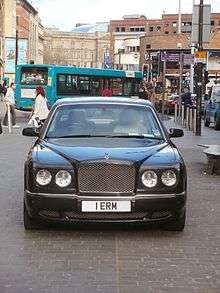Rex Makin

Elkan Rex Makin, (20 August 1925 – 26 June 2017)[1] usually known as Rex Makin, was a solicitor and philanthropist who practised in Liverpool, England, for over sixty years. He was most noted for his involvement with the Beatles' early career and subsequently high-profile cases such as the Hillsborough and Heysel Stadium disasters, the Walton sextuplets and the re-opening of the Cameo Murder case. A freeman of the City of Liverpool, he also supported the arts and held an honorary professorship at Liverpool John Moores University. He also wrote a weekly column in the Liverpool Echo.
Early life
Born in Birkenhead in 1925, Makin was the only child of Joe and May Makin.[2] His family was Jewish and moved to Liverpool in the 1850s and his great-great grandfather set up shop as a seamens' outfitter in Old Hall Street. His father was brought up on Park Lane in the Chinatown area of Liverpool, where he made and supplied trunks to seamen.[3] Makin studied law at the University of Liverpool, gaining his LL.B in 1945 and LL.M in 1947.[4]
Career
Makin was the family solicitor to Brian Epstein, who in 1963 sought his advice on setting up a perpetually binding contract between himself and the Beatles; however, Makin advised Epstein that such an agreement would be legally indefensible.[2] He has been credited with inventing the term "Beatlemania". Following Epstein's death in 1967, Makin arranged his funeral.[5]
Honours
In 2003 he was appointed a Freeman of the City of Liverpool, the first solicitor to receive that honour. He said at the time
As a lawyer I'm not used to the establishment being nice to me. The ordinary people of Liverpool and I have had a long standing love affair. I've been there in all their disasters and most of their triumphs. This honour fills me with great pride. It recognises my contribution to the cultural and educational life of Liverpool. It is particular gratifying to receive it in the same year as the city was named European Capital of Culture.[2]
References
- Notes
- ↑ "Rex Makin, Liverpool's best-known lawyer, has died". Retrieved 2008-06-27.
- 1 2 3 "Liverpool freedom for lawyer of Beatles manager". 31 October 2003. Archived from the original on 2008-06-28. Retrieved 2008-10-26.
- ↑ "Rex Makin endows new galleries at city museums". November 1999. Retrieved 2008-10-27.
- ↑ "Precinct - Oct 05 Issue 206 THE UNIVERSITY OF LIVERPOOL MAGAZINE FOR STAFF & STUDENTS" (PDF). Retrieved 2008-10-26.(3.3Mb)
- ↑ "Currie prime example of biting hand that feeds". Liverpool Echo. 22 August 2008. Retrieved 2008-10-27.
- Sources
- Rex Makin obituary, The Guardian 11 July 2017.